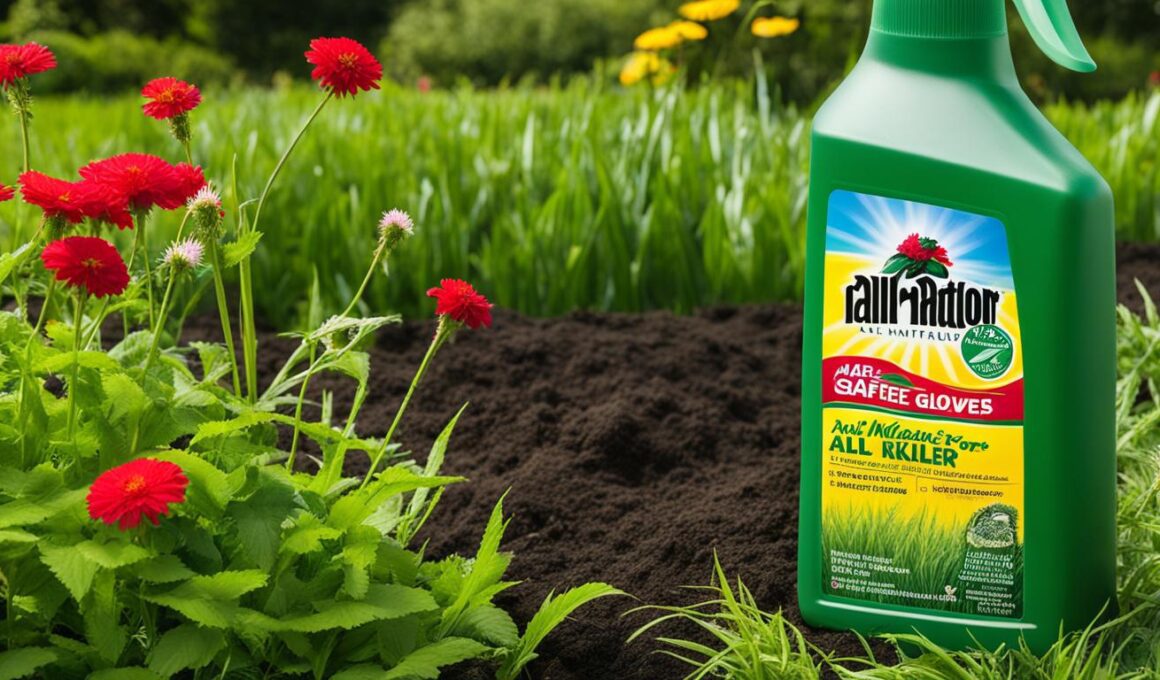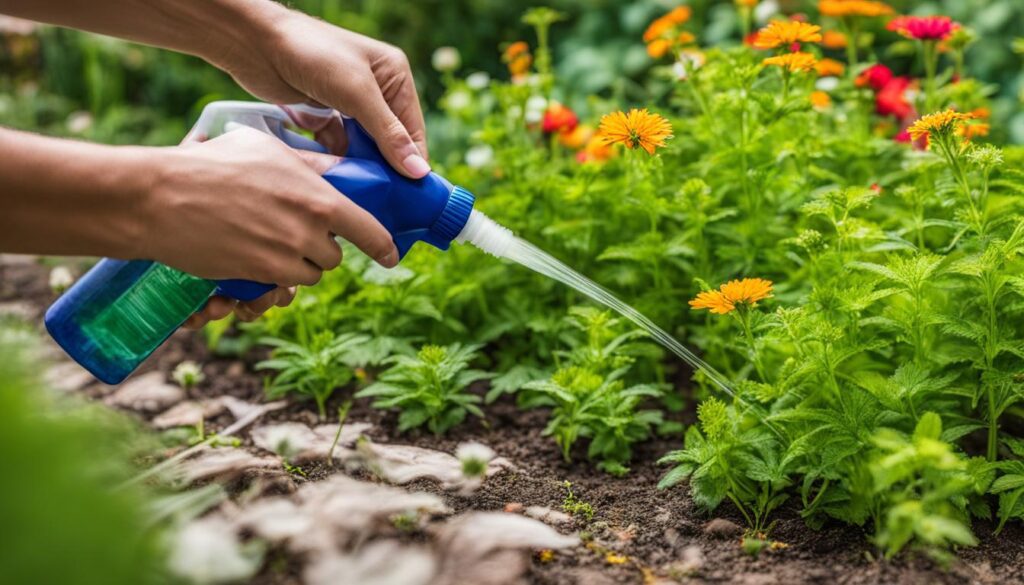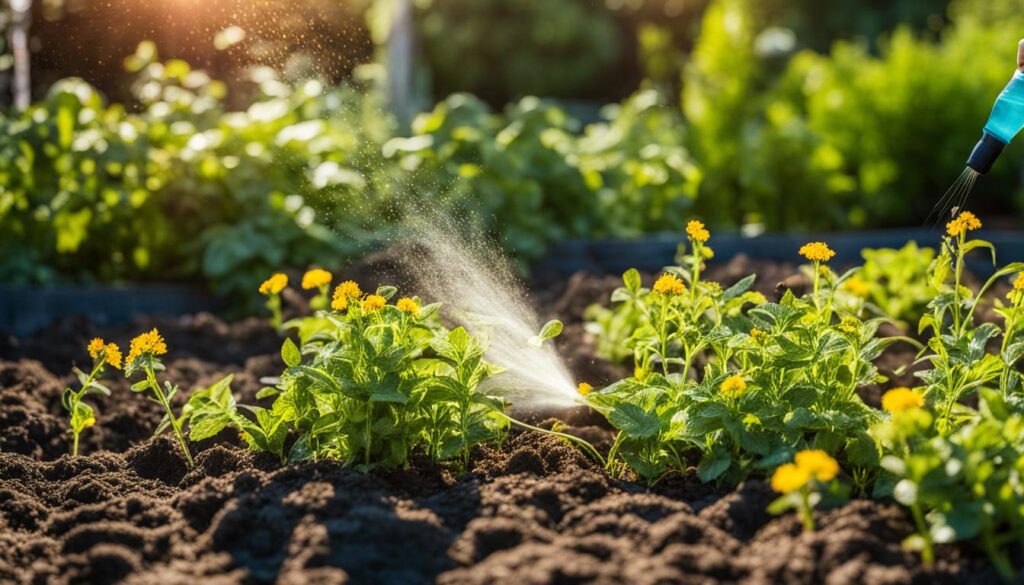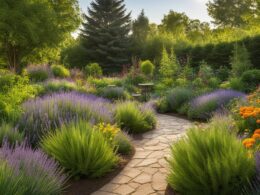Many weed killers on the market can be toxic to humans and pets, and they can also harm your flowers and garden plants. However, there are natural weed killers that are safe and effective for controlling weeds without harming your plants. These natural remedies for weeds can be made at home using common ingredients like vinegar, lemon, and salt. By using these natural weed killers, you can protect the environment, the health of your family and pets, and still achieve effective weed control in your flower beds.
Key Takeaways:
- Natural weed killers are a safe and effective alternative to chemical-based products.
- Homemade weed killers can be made using common ingredients like vinegar, lemon, and salt.
- Natural weed control methods are environmentally-friendly and do not harm your plants or the soil.
- By using natural weed killers, you can protect the health of your family and pets.
- Effective weed control can be achieved without compromising the beauty of your flower beds.
Why Use Natural Weed Killer for Flower Beds
Natural weed killers, also known as organic weed killers, are a great alternative to chemical-based store-bought weed killers. These homemade weed killers are free from pesticides and herbicides that can harm the environment. They are also safe for your children and pets.
Chemical-based weed killers work by killing weeds at the root, but they can also kill your flowers and garden plants. This can be detrimental to the overall health and aesthetic of your flower beds. Natural weed killers provide a safe, non-toxic way to control weeds and achieve similar results without harming your plants or the environment.
Organic gardening practices not only promote healthier plants, but they also contribute to a more sustainable and environmentally-friendly approach to weed control. By utilizing natural weed killers, you can maintain the beauty of your flower beds while minimizing negative impacts on the ecosystem.
Using natural weed killers aligns with the principles of organic gardening, which emphasizes the use of natural methods and materials to cultivate plants and control pests. By incorporating environmentally-friendly weed control methods into your gardening routine, you can create a more sustainable and harmonious outdoor space.
Benefits of Natural Weed Control in Organic Gardening
- Preserves Soil Health: Chemical weed killers can leach into the soil, disrupting its natural balance and potentially causing harm to beneficial microorganisms. Natural weed controls, on the other hand, help maintain soil fertility and promote healthy plant growth.
- Protects Water Sources: Chemical-based weed killers can contaminate groundwater and nearby water bodies when it rains or during irrigation. Opting for natural weed killers helps protect these water sources from harmful chemicals.
- Reduces Health Risks: Chemical weed killers often contain toxic substances that can pose health risks to humans and animals. By using natural weed control methods, you eliminate the potential dangers associated with chemical exposure.
- Supports Biodiversity: Natural weed control methods promote a diverse range of plant life, which in turn attracts beneficial insects and wildlife to your garden. This creates a balanced ecosystem and enhances the overall biodiversity of your outdoor space.
By choosing natural weed killers for your flower beds, you not only protect your plants and the environment, but you also contribute to a healthier and more sustainable gardening practice. Embracing organic gardening principles and adopting environmentally-friendly weed control methods can result in a beautiful and thriving garden that you can enjoy guilt-free.
Top Natural Weed Killers that are Safe for Flowers
When it comes to maintaining a beautiful garden, weed control is a crucial aspect. However, many weed killers can be harmful to your flowers and plants. Luckily, there are several natural weed killers that are both safe for flowers and effective in controlling weeds.
First on the list is boiling water, a simple yet powerful solution. Boiling water can be poured directly onto weeds, effectively killing them without harming your flowers. This method is especially useful for weeds growing in cracks or between paving stones.
Cornmeal is another natural weed killer that won’t harm your flowers. It works by preventing weed seeds from germinating, effectively stopping their growth. Simply sprinkle cornmeal around your flower beds to provide a natural barrier against weeds.
Vinegar, mixed with dish soap, is a popular homemade weed killer. The acetic acid in vinegar acts as a herbicide, effectively killing weeds on contact. Adding dish soap helps the vinegar stick to the weeds, increasing its effectiveness. Be careful not to spray vinegar directly on your flowers, as it can damage them as well.
Lemon juice, when mixed with vinegar, can act as a natural herbicide. The citric acid in lemon juice enhances the weed-killing properties of vinegar. This homemade mixture can be sprayed directly on weeds, ensuring effective and safe weed control.
Mulch is a fantastic natural weed control method that is also beneficial for your flowers. By applying a layer of mulch around your flower beds, you can block out the light that weeds need to grow. Mulch also helps to retain moisture in the soil and enriches it as it breaks down, promoting healthy flower growth.
Salt, when used carefully, can be an effective weed killer. Sprinkling salt at the base of weeds can dehydrate them, leading to their demise. However, it’s essential to avoid excessive salt use, as it can harm the soil and nearby plants. Use salt sparingly and directly on the weeds, keeping it away from your flowers.
Lastly, don’t underestimate the power of pulling weeds by hand. While it may be a more labor-intensive method, pulling weeds by hand is an old-fashioned and effective way to control them. Be sure to remove the entire weed, including the roots, to prevent regrowth.
By incorporating these natural weed killers into your gardening routine, you can effectively control weeds without causing harm to your beloved flowers. Choose the method that works best for you and enjoy a beautiful, weed-free garden!
Best Weed Killers for Flower Beds
If you’re looking for ready-made weed killers for your flower beds, there are several options available. For pre-emergent weed control, which prevents weeds from growing in the first place, some top picks include Preen Natural Garden Weed Preventer, Miracle-Gro Shake ‘N Feed Weed Preventer, and Preen Extended Control Weed Preventer. For post-emergent weed control, which kills existing weeds, some top picks include Just For Pets Pet Friendly & Pet Safe Weed Killer, Ortho GroundClear Super Weed and Grass Killer, and Natural Armor All-Natural Weed & Grass Killer Concentrate. These weed killers are specifically formulated to target weeds while being safe for flowers and plants.
If you prefer the convenience of ready-made weed killers, these options provide effective solutions for tackling weeds in your flower beds. Whether you’re preventing weeds from sprouting or eliminating existing ones, these products are designed to deliver targeted results without harming your beloved flowers.
Home Remedies for Weed Control
In addition to natural weed killers and ready-made products, there are also home remedies that can effectively control weeds. These home remedies provide safe and cost-effective alternatives for weed control in your flower beds. Let’s explore a few effective homemade solutions:
1. Vinegar Weed Killer
A popular home remedy for weed control is using vinegar as a natural herbicide. Vinegar contains acetic acid, which can kill weeds by drying out their leaves and stems. To make a vinegar weed killer, mix white vinegar with a teaspoon of dish soap in a spray bottle. Spray the solution directly onto the unwanted weeds, making sure to avoid any desirable plants. Repeat the application as necessary until the weeds are effectively controlled.
2. Baking Soda Weed Control
Baking soda is another home remedy that can help control weeds by altering the pH of the soil. Sprinkling baking soda directly on the soil around the weeds can make it less hospitable for weed growth. Baking soda is particularly effective on weeds that prefer acidic soil conditions. However, it’s important to use baking soda sparingly and avoid contact with desirable plants, as it can also raise the pH level of the soil, which may affect their growth.
3. Salt Water Treatment
A simple and accessible home remedy is using salt water to control weeds. Mix a tablespoon of salt with a cup of warm water until the salt is fully dissolved. Carefully pour the salt water solution directly onto the base of the weeds. The salt will dehydrate the weeds, inhibiting their growth. It’s important to note that excessive salt usage can harm the soil’s fertility, so use this method sparingly and avoid contact with desirable plants.
4. Mulching and Newspaper
Mulching and newspaper can act as effective weed barriers, preventing weed growth by blocking sunlight and suppressing weed seeds. Spread a layer of mulch or newspaper around your desirable plants to smother existing weeds and prevent new ones from emerging. Organic mulch options such as wood chips, straw, or shredded leaves can also improve soil moisture retention and enhance the growth of your plants. Remember to refresh the mulch layer periodically to maintain its effectiveness.
By utilizing these home remedies for weed control, such as vinegar weed killer, baking soda weed control, salt water treatment, and mulching, you can naturally and effectively manage weeds in your flower beds while safeguarding your plants and the environment.
Are there weed control options that won’t harm St Augustine grass when combatting fungus?
When looking to combat fungus in St Augustine grass, there are weed control options available that won’t harm the grass. Selective herbicides like atrazine and metribuzin can effectively combat fungus while preserving the health of the St Augustine grass. It’s important to choose the right products and apply them carefully.
Conclusion
In conclusion, maintaining a beautiful and weed-free garden is achievable through natural and safe weed control methods. By implementing a combination of natural weed killers, home remedies, and purpose-made products for flower beds, you can effectively control weeds while keeping your precious plants unharmed. Remember, though, that maintaining a healthy lawn is just as important as weed control.
A healthy lawn acts as a natural barrier against weed growth, so make sure to prioritize its maintenance. Keep your lawn thick and lush by regular mowing, proper watering, and fertilizing according to the needs of your grass type. This will help prevent weed invasion and promote a vibrant and weed-free garden environment.
By adopting these natural weed control tips and maintaining a healthy lawn, you can create a beautiful and flourishing garden that is safe for both your plants and the environment. Embrace the power of natural remedies and environmentally-friendly practices to enjoy a weed-free garden that will impress both you and your neighbors.











